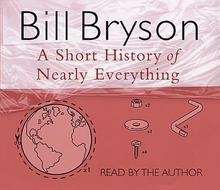A Short History of Nearly Everything audiobook (5 CDs)

Resumen del libro
A Short History of Nearly Everything is Bill Bryson's quest to find out everything that has happened from the Big Bang to the rise of civilization - how we got from there, being nothing at all, to here, being us.
His challenge is to take subjects that normally bore the pants off most of us, and see if there isn't some way to render them comprehensible to people who have never thought they could be interested in science. It's not so much about what we know, as about how we know what we know. How do we know what is in the centre of the Earth, or what a black hole is, or where the continents were 600 million years ago? How did anyone ever figure these things out?
On his travels through time and space, Bill Bryson takes us with him on the ultimate eye-opening journey, and reveals the world in a way most of us have never seen it before.
Biografía del autor
x{0026}lt;p Bill Bryson (Des Moines, Iowa, 1951) inició la carrera de Periodismo en Estados Unidos, pero la interrumpió para viajar por Europa. En 1977 se instaló en North Yorkshire, Inglaterra, donde residió dos décadas y trabajó en periódicos como x{0026}lt;em The Timesx{0026}lt;/em o x{0026}lt;em The Independentx{0026}lt;/em . Aunque también se ha dedicado a la enseñanza (llegó a ser rector de la Universidad de Durham), actualmente se dedica sobre todo a escribir. Es autor de, entre otros libros superventas,x{0026}lt;em Una breve historia de casi todox{0026}lt;/em (Premio Aventis de libros de ciencia y finalista del Premio Samuel Johnson);x{0026}lt;em El cuerpo humano; En casa: una breve historia de la vida privada; Un paseo por el bosque; Aventuras y desventuras del Chico Centella; Shakespeare; 1927: un verano que cambió el mundo; Viaje al sueño americano, Crónicas de Gran Bretañax{0026}lt;/em y x{0026}lt;em Nuevas crónicas de Gran Bretañax{0026}lt;/em , todos publicados por RBA. x{0026}lt;/p







